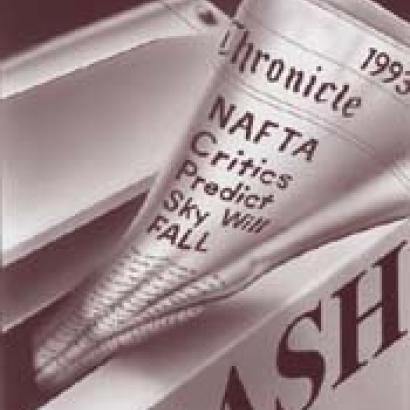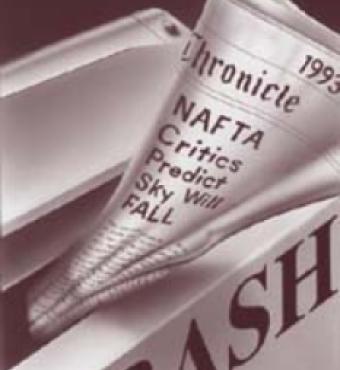- Economics
- International Affairs
- US Foreign Policy
It has been clear since the acrimonious 1993 debate over the North American Free Trade

Agreement (NAFTA) that our country's politics over trade policy are changing in a fundamental and dangerous way. Apparently well-meaning social groups that erroneously view imports as a threat to their favored social programs, from welfare to environmental protection, have been joining self-interested parties like U.S. trade unions in their opposition to free trade. That new protectionist social policy coalition lost the debates over NAFTA and then the General Agreement on Tariffs and Trade (GATT). But it recently scored a huge victory by helping derail President Clinton's request for "fast-track" trade negotiating authority.
But the fierce opposition of social policy advocates to free trade doesn't stand up to rational analysis. Many U.S. environmentalists, for example, claimed that NAFTA would undermine U.S. environmental standards. "The truth about NAFTA," wrote former California governor Jerry Brown, "is that it will create a race to the bottom in environmental standards. This is inevitable if we rashly link ourselves to Mexico, where environmental laws are unenforced."
But NAFTA has been in effect four years now, and the predicted "race to the bottom" in environmental standards has not materialized. The sole environmental effect of NAFTA has been that some--not many--high-polluting firms (U.S. furniture finishers in central Los Angeles, for instance) have moved their plants to Mexico, where they could use more-effective but also more-toxic furniture sprays.
Such relocations shift the production of pollution inside NAFTA from a nation where the marginal social cost of pollution is relatively high to one where it is lower. (The relatively high U.S. environmental standard implies that the United States is willing to pay more private resources to reduce pollution by one unit than is Mexico.) Thus even though Mexico loses from more pollution, and the United States gains from less pollution, the gain to the United States must be greater than the loss to Mexico because of the differences in the two countries' marginal social costs of pollution.
| The sole environmental effect of NAFTA has been that some—not many—high-polluting firms have left the United States. |
An arithmetic example illustrates this point. Assume the marginal, or extra, social cost (in terms of willingness to pay) from an additional unit of pollution is $6 in the United States and $3 in Mexico. When the production of one unit of pollution is transferred from the United States to Mexico, the United States thus gains $6 and Mexico loses $3. This represents a net gain of $3 for the free trade area as a whole. Free trade thus causes a more rational, that is, less costly distribution of pollution inside the free trade area, not an adjustment in environmental standards.
| Despite free trade between the two countries for nearly a decade, Canada's welfare policy continues to be significantly more generous than America's. |
Experience with the U.S.-Canadian free trade agreement shows that free trade is also compatible with different national welfare objectives. The agreement was opposed by Canadian Social Democrats who feared that free trade with the United States would undermine generous Canadian social welfare programs. "[New Democratic Party] leader Edward Broadbent says his rejection of the free trade pact is motivated less by its actual terms than by his fear that there will inevitably be capitalist pressure on social programs under it," reported Toronto's Globe & Mail in 1988. "Mr. Broadbent told reporters, 'I have an immense fear that if the agreement is put in place, corporate pressures would mount to harmonize Canadian social policies, such as subsidized Medicare and pensions, with lower American standards.'"
Mr. Broadbent's fears proved groundless, however. The U.S.-Canadian free trade agreement has been in place for almost ten years, and Canada's welfare policy continues to be significantly more generous than America's. One reason: The Canadian dollar fell relative to the U.S. dollar to adjust for the higher social charges Canada imposes on its goods. Canada's depreciated currency made U.S. goods more expensive in the Canadian market and, by doing so, prevented the feared explosion of U.S. imports into Canada.
Perhaps the most outspoken opponent of free trade among U.S. social policy advocates is the so-called consumer advocate Ralph Nader (so-called because, since Adam Smith, the raison d'être of free trade has been consumer protection). Nader fears GATT and the newly established World Trade Organization will pull down U.S. consumer protection standards to foreign levels. "Since our country has numerous laws that are more protective of its citizens than those of other nations," wrote Nader, "the U.S. would be frequently delinquent. If these unaccountable tribunals decide that our laws--for example, those advancing food, air, and water safety--are 'nontariff trade barriers,' we would be obliged to repeal them or pay perpetual fines."
Trade neutrality, however, does not imply a pulling down or scaling back of U.S. consumers' standards as Nader argues--only that U.S. consumerist legislation be cleansed of its protectionist features. For example, when Europeans argue that a U.S. carbon tax would be a less trade-restricting way of promoting clean air than the present U.S. gas-guzzler tax and fuel efficiency laws, they are not opposing U.S. clean air legislation per se. Similarly, when Europeans favor signs in supermarkets, not disclosures on the products themselves, as a less trade-restricting way of providing U.S. consumers with nutrition information, they do not want to deny U.S. consumers access to information--only to change the way information is passed along.
| By identifying protectionism with protection of the environment and human rights, protectionists are gaining an undeserved moral high ground in the battle with free traders. |
In its first substantive ruling, the World Trade Organization did rule that part of the United States' Clean Air Act discriminated against foreign producers. But it nonetheless affirmed the right of the United States to protect its environment to any extent it wants, so long as the law does not favor domestic producers over foreign ones.
U.S. social policy advocates should look not only to the Canadian experience for guidance but to that of the Northern European welfare states as well. In Sweden, the Netherlands, and Denmark, social welfare programs literally exploded during the 1950s and 1960s; at the same time, these small European welfare states all followed free trade policies. The $64,000 question? If free trade undermines social welfare programs, as new protectionists fear, why did social democracy flourish in those free trade countries during this twenty-year period?
The answer is that free trade actually helps, not hurts, social welfare programs. The gains from international trade provide income to the trading partners. In Northern Europe, part of this income was used to finance welfare state programs. Open markets have meant more health services, more education, and more social security for Northern Europeans than otherwise would have been the case. From a political standpoint, it is easier to allocate resources to social programs when the nation's economic pie is growing.
Notwithstanding, the danger posed by the new protectionist coalition to free trade should not be discounted. By identifying trade protection with protection of the environment, Naderesque consumer rights, human rights, and social welfare benefits, protectionists are gaining an undeserved moral high ground in their battle with free traders. Enemies of free trade understand the popularity of these social causes and have been clever to attach trade protectionism to them--not only by forming political coalitions with these social groups but by adopting their language and style. Trade unions pursuing their protectionist objectives, for example, pretend they are attempting to stave off a race to the bottom in labor standards, when in fact they're trying to boost U.S. wages to noncompetitive levels.
Enemies of the welfare state, in contrast, do free trade no favor when they also argue that the welfare state is incompatible with free trade. For if the public must choose between popular social causes on the one hand and a somewhat arcane, poorly understood, and much-maligned free trade policy on the other, the outcome may not be a happy one for the followers of Adam Smith.
One lesson from President Clinton's defeat on fast track is clear: Free traders must delink trade protection from social causes, whatever their merits. Otherwise, further protectionist victories loom on the not-too-distant horizon.
















